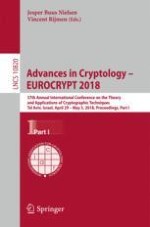2018 | OriginalPaper | Buchkapitel
Towards Breaking the Exponential Barrier for General Secret Sharing
verfasst von : Tianren Liu, Vinod Vaikuntanathan, Hoeteck Wee
Erschienen in: Advances in Cryptology – EUROCRYPT 2018
Aktivieren Sie unsere intelligente Suche, um passende Fachinhalte oder Patente zu finden.
Wählen Sie Textabschnitte aus um mit Künstlicher Intelligenz passenden Patente zu finden. powered by
Markieren Sie Textabschnitte, um KI-gestützt weitere passende Inhalte zu finden. powered by
Abstract
-
First, we present secret-sharing schemes for a family of \(2^{2^{n/2}}\) monotone functions over \(\{0,1\}^n\) with sub-exponential share size \(2^{O(\sqrt{n} \log n)}\). This unconditionally refutes the stronger conjecture that circuit size is, within polynomial factors, a lower bound on the share size.
-
Second, we disprove the analogous conjecture for non-monotone functions. Namely, we present “non-monotone secret-sharing schemes” for every access function over \(\{0,1\}^n\) with shares of size \(2^{O(\sqrt{n} \log n)}\).
